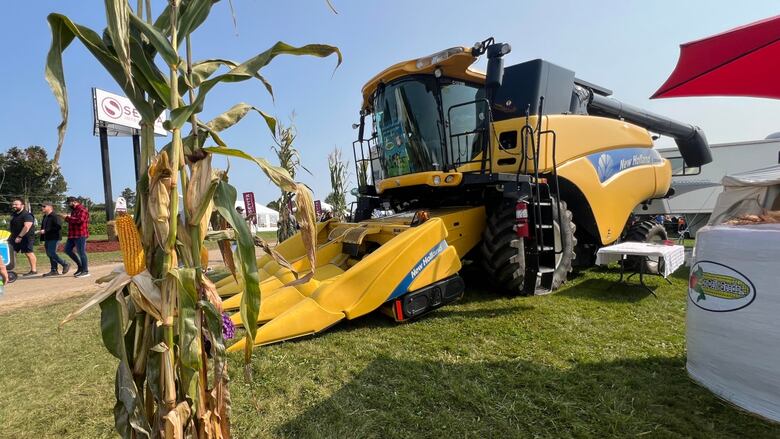Ontario's largest outdoor farm show draws crowds of thousands to explore innovative agriculture
Drones, automatic milking machines and other innovations help farms stay competitive

If anyone could use a reminder about the impact of agriculture on the Canadian economy, they need only visit Canada's Outdoor Farm Show in Woodstock, Ont.
The annual show, running September 10 to 12 this year, fills a 40-hectare, or 100-acre, site with more than 600 vendors. Their wares include everything farm-related from massive combines to top-of-the-line tractors, and the latest gear in fencing, feed and seeds.
But among the multi-coloured, mammoth machinery are vendor stalls much smaller in size, having a growing importance in the farming industry. They sell electronics, drones, software and hardware all geared toward efficient farming.

"That's why people come to this event, they want to see the new innovations that are being unveiled to the industry," said Rob O'Connor, the show's director.
Every dollar saved in farm production is crucial for Canada, which has to compete in a global marketplace with land and labour costs that are far from the world's cheapest, O'Connor said.
"Only two per cent of our population are agricultural producers and it's difficult for them to find people who are like-minded or want to enter the workforce," he said. "So we need technology to help us replace those human bodies that just aren't available any more."

New machines equipped with sensors can minimize waste when it comes to everyday farm tasks, whether it's sowing, storing, feeding or fertilizing.
"Precision agriculture is the thing," said O'Connor. "Farmers adopt new technology when it's worthwhile for them."
One of the venders at the show is DeLaval, a company that makes automatic, robotic milkers. The cow walks to the machine and a robotic arm automatically extends outward, cleans the teat and begins the milking process entirely, untouched by human hands.

Mark Borersma said it's a huge boost for a busy dairy farmer.
"The upside is really the freedom," he said. "Cows are getting milked through the whole day so if your son has sports at six o'clock, the farmer can see the son at soccer.
"You still have to work hard as a farmer, the cows still take a lot of work but there is some more flexibility, and it is easier on the body."
Borersma estimates that about 20 per cent of Ontario dairy farms have moved toward some form of automated milking technology. However it's an upgrade that doesn't come cheap. Depending on options, the machines can cost anywhere from $150,000 to $200,000.
Borersma said over time, it's worth the labour savings.

Also at the show, Dennys Pychnenko tells visitors about feed mixers from Siloking Canada, an Ontario-based agricultural machinery manufacturer.
The high-tech vehicle has a glassed-in cab with a full array of cameras and computer screens. It has a milling head that sucks up various feed components then mixes them into precise formulas inputted by the farmer on a touch screen.
It's an investment north of $300,000, depending on the model, but brings many advantages to the busy beef or dairy farmer because it eliminates the need to do with job with a tractor, trailer and mixer.
"You have all of that in one machine," said Pychnenko. "Farmers are definitely always trying to find ways to save time and money. When you add up all the numbers, it makes sense and farmers do see it as an investment."
O'Connor said Canadian farmers often struggle to find the labour they need, and that's where technology can help.

"It's hard to find someone who wants to feed 100 or 200 calves," he said. "It's a long hard job but they still need to be cared for and looked after and now we can add autonomous agriculture to do just that."
The three-day farm show, now in its 31st year, wraps up Thursday, Sept. 12.
You can find more information about the show here.